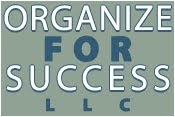- Address Book - For contacts' names, phone numbers, emails and snail mail addresses as well as any notes gathered via interactions with that person, keeping everything centralized within one system better enables it will stay up-to-date and be quickly accessible whenever or wherever needed, rather than having the business card left elsewhere or the phone number locked in another tool. It is best to have your solution sync across devices, meaning you don't have to manually enter details' changes on computers as well as mobile devices.
- Calendar - Whether it's paper or electronic, a single place to track all time commitments (personal and professional) makes it less likely that appointments will be forgotten or you'll double-book yourself. If you choose an electronic option, you can still benefit from the power of one principle with various calendars for different elements of life, like one shared with your spouse, one shared with folks at work and one for volunteer commitments, as long as you have a viewing option to see everything at once, letting conflicts be visible easily.
- Cloud-Based, Automated Back-up - Computers crash. Fires can destroy all your devices. Emergencies happen. It is with an automated, remote storage of all data from your hard drive that you can truly be prepared for anything. There is a difference between an online file repository and a cloud-based, automated back-up, which means both are necessary, and it's important to be strategic in managing electronic files. Unlike a hard-drive that you attach to your computer for backing up data, a cloud solution isn't at risk of natural disasters in your physical proximity, doesn't require you remembering to hook it up for activating the back-up and has multiple points at which your data storage is duplicated as well as protected.
- "Data Dump" of Information - Human-beings are inundated daily with information, like meeting notes, ideas, reference articles, checklists, process steps, voice mails, blog posts, emails, texts and inspirations. Since our brains are meant for thinking, not remembering, it's important to document everything. Keeping it all in one place limits the places you must check when trying to find whatever's needed.
- File-Naming Structure - Whether paper files, electronic documents or saved emails, having each folder and individual file follow the same naming conventions will allow you to know what goes where and more easily retrieve each item later. If you have to ask "where should I file this?" when assigning a home to newly received or created content, how will you ever be able to find it later? Make sure you have enough folders for all the content to be retained while not having so many folders that any one item could go into more than one; then, keep your file-naming structure simply while avoiding "miscellaneous" so it's easy to replicate across the various retention platforms.
- Password Manager - There's no doubt that our list of websites and software solutions requiring logins is continually growing, and we must protect ourselves with better password management. Listing all usernames and passwords in one place saves time as we're frantically trying to get logged in, and an electronic solution is more secure, allows easier access while on-the-go, creates more secure passwords, can alert you automatically when any site has been hacked and works cross-platform so you always have the right login information, no matter which device is being utilized to access your account.
- Strategy for Attacking Priorities - Proactively create the direction in which you will proceed each week rather than living in reactionary mode by completing a weekly strategy session to develop a game plan for tasks, communications, time commitments and development opportunities in advance. Use your weekly strategy to ward off time stealers and others priorities since knowing where you're headed helps in getting there. Then, implement a daily wrap-up to stay on track throughout the week, avoiding deviations from curveballs that life will throw your way while addressing what matters most.
- To-Do List - When jotting tasks down in different notebooks, on meeting agendas, using sticky notes atop your desk or on the napkin you grab in the drive-through line, it's more difficult to know what needs to be done when. Alternatively, keeping all the action items needing your attention in one place makes it more likely they'll get completed, aides in prioritizing and allows for divvying out must-do items across each day of the week. If you opt for an electronic task manager app, it adds reminders, easier carryover, recurrences and useful integrations.
Where do you see the power of one boosting your productivity currently? How can you streamline your toolbox to have one tool for each listed function?


1 comment:
As we know, Big data implementation services is the future of the industries these days, this article helps me to figure out which language I need to learn to pursue the future in this field.
Post a Comment